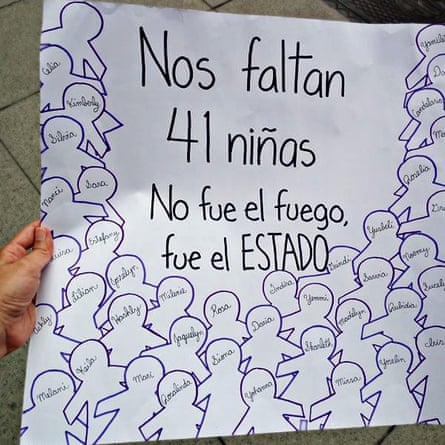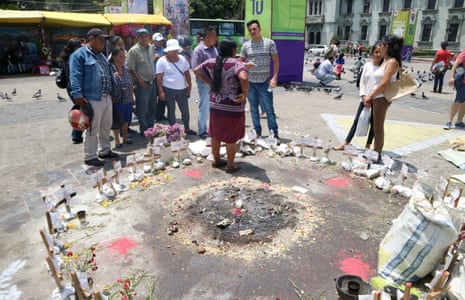Outside Palacio Verde, in the centre of Guatemala City, a woman stands on a pile of ash and scattered flower petals. Near her feet is a circle of wooden crosses, each marked with the name of a girl killed last month in a fire at Virgen de la Asunción, an orphanage in San José Pinula.
Three people have since been arrested in connection with the fire, which killed 41 girls between the ages of 14 and 17. The girls were among those locked in a room as punishment for a recent escape attempt. The fire started when one of the girls set fire to a mattress in protest at their treatment; survivors said the girls had pleaded to be released from the room, but their cries were ignored.
The former minister of social welfare, along with his deputy and the director of the orphanage, have been charged with negligent homicide. But lawyers representing the families of the dead girls are now pushing for charges of femicide to be brought.
They argue that the girls were subjected to abuse and neglect indicative of wider state failings on the protection of women in Guatemala. Lawyers and campaigners are also calling for an investigation into the failure of the police to act on accusations of abuse made by the girls.
“This has been the responsibility of the state for a long time,” said Paula Barrios, a lawyer involved in the case who represented women from Sepur Zarco when they successfully took the military to court over allegations of sexual slavery during the country’s long civil war.
“The state did not guarantee an effective protection mechanism, nor take the urgent and necessary measures to guarantee the life and integrity of these girls following many allegations of rape, mistreatment and disappearance of girls from the home.”
Though Guatemala introduced legislation outlawing violence against women in 2008, the country still has one of the world’s highest rates of femicide and an impunity rate – 98% – to match. For crimes committed against children – including sexual abuse, rape and murder – 88% of cases go unpunished.
The San José Pinula orphanage, which lies south-west of the capital, has a capacity of 400 children. At the time of the fire, however, it was home to about 750 children. Many of the girls who perished in the fire came from poverty-stricken families who placed their children in the home in the hope that they might find a better life.
On the day of the fire, the children had staged a protest over their alleged mistreatment, which included claims of physical and sexual abuse. As early as 2013, the government had received reports of ill-treatment and sexual abuse at the orphanage. Despite recommendations to close the home at the end of 2016, it remained open.

The treatment and death of the girls has prompted the country’s feminist movement to campaign for action to end violence against women and girls, and end impunity. Campaigners have held vigils and taken to social media using the hashtag #NosFaltan41 – “we are missing 41” – to coordinate protests, and spread the word about the fire globally.
Women across Guatemala have posted photos of themselves on Facebook aged between 14 and 17, the same age as the victims. Alongside, they shared memories of what they were like at that time in their life.
Activists have demonstrated outside Guatemalan embassies in countries including Venezuela and Mexico.
On the day of the fire, Celeste Mayorga, who has been a women’s rights campaigner in the country for seven years, joined other campaigners who flocked to the scene to provide practical support.
“The families of the girls were alone in the streets,” said Mayorga, a volunteer and consultant on gender-based violence campaigns. “No one was helping them, and they were cold. That day, I didn’t see faces, I just saw people crying and screaming. I feel my throat closing thinking about it: I know that, without a doubt, I won’t be the same woman, human or citizen in this country after seeing that.”
Mayorga, who has attended the court proceedings to support the girls’ families, added: “In Guatemala you always live in alert mode, whether you’re a woman or a man, a child or elderly – but especially if you’re a woman.”
Rossalyn Warren is a reporter and contributor to the Fuller Project for International Reporting. Reporting for this article was supported by the European Journalism Centre









